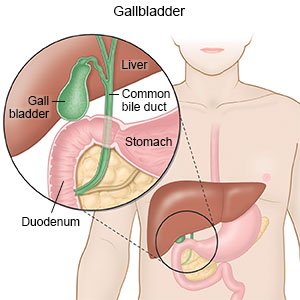Endoscopic Biliary Stent Placement
Medically reviewed by Drugs.com. Last updated on Apr 6, 2025.
An endoscopic biliary stent placement is a procedure to open a blocked bile duct. Your bile duct carries bile from your gallbladder to your small intestine. Bile helps your body digest foods. A stent is a small tube made of plastic or metal. The stent helps widen your bile duct and keeps it open.
 |
DISCHARGE INSTRUCTIONS:
Seek care immediately if:
- You have severe abdominal pain or your abdomen is larger than usual.
- You faint.
- You vomit blood or something that looks like coffee grounds.
- You have blood in your bowel movements, or your bowel movements look like tar.
- Your skin or whites of your eyes are yellow.
Contact your healthcare provider if:
- You have a fever or chills.
- You have nausea or are vomiting.
- Your skin is itchy, swollen, or you have a rash.
- You have questions or concerns about your condition or care.
Drugs used to treat this and similar conditions
Nexavar
Nexavar is used to treat advanced renal cell carcinoma. Learn about side effects, interactions and ...
Keytruda
Keytruda is used to treat multiple types of cancer such as melanoma, non-small cell lung cancer ...
Otezla
Otezla (apremilast) is used to treat plaque psoriasis, psoriatic arthritis, and oral ulcers ...
Imfinzi
Imfinzi (durvalumab) is an immunotherapy used to treat types of lung cancer (NSCLC, SCLC), bile ...
Ancef
Ancef is used for bacterial endocarditis prevention, bacterial infection, bone infection ...
Tibsovo
Tibsovo (ivosidenib) is a once-daily oral medication that targets a specific gene mutation called ...
Sandostatin
Sandostatin is used to treat acromegaly and to reduce flushing episodes and watery diarrhea caused ...
Sandostatin LAR Depot
Sandostatin LAR Depot is used for acromegaly, carcinoid tumor, vasoactive intestinal peptide tumor
Durvalumab
Durvalumab (Imfinzi) is an immunotherapy used to treat lung cancer (NSCLC, SCLC) and other cancers ...
Octreotide
Octreotide systemic is used for acromegaly, carcinoid tumor, diabetes, type 1, diarrhea, dumping ...
Medicines:
- Medicines may be given to decrease pain.
- Take your medicine as directed. Contact your healthcare provider if you think your medicine is not helping or if you have side effects. Tell your provider if you are allergic to any medicine. Keep a list of the medicines, vitamins, and herbs you take. Include the amounts, and when and why you take them. Bring the list or the pill bottles to follow-up visits. Carry your medicine list with you in case of an emergency.
Self-care:
- Rest as directed. Return to your regular activities in 24 hours or as directed.
- Drink liquids as directed. Liquids will help flush the contrast liquid from your body. Ask how much liquid to drink each day and which liquids are best for you.
- Eat small meals more often. This may help prevent nausea. Do not eat spicy or greasy foods.
Follow up with your healthcare provider as directed:
You may need to return for more tests. Write down your questions so you remember to ask them during your visits.
© Copyright Merative 2025 Information is for End User's use only and may not be sold, redistributed or otherwise used for commercial purposes.
The above information is an educational aid only. It is not intended as medical advice for individual conditions or treatments. Talk to your doctor, nurse or pharmacist before following any medical regimen to see if it is safe and effective for you.
Further information
Always consult your healthcare provider to ensure the information displayed on this page applies to your personal circumstances.
